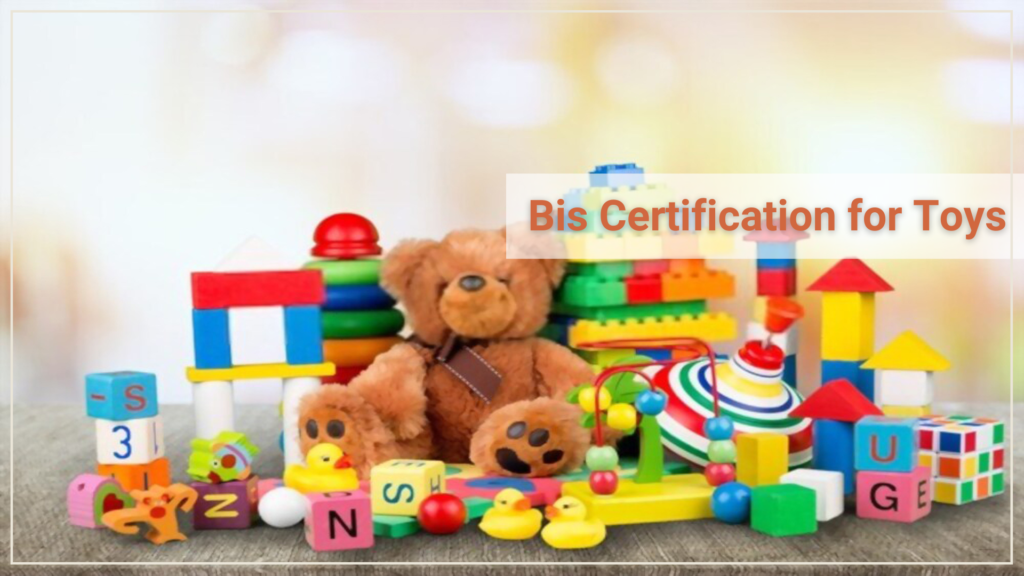BIS Certification for Toys: The Indian toy market is booming, driven by a growing population and rising disposable incomes. However, to tap into this lucrative market, both domestic and foreign toy manufacturers and importers must comply with mandatory regulations set by the Bureau of Indian Standards (BIS). Obtaining a BIS certificate signifies that your toys meet stringent safety and quality standards, allowing you to legally sell them in India and gain consumer trust.
This comprehensive guide delves into everything you need to know about BIS certification for toys in India. We’ll explore the importance of certification, the different schemes applicable, the step-by-step process, and the invaluable role of BIS certification consultants. Additionally, we’ll address frequently asked questions and provide valuable tips to ensure a smooth and successful certification journey.
Why is BIS Certification Crucial for Toys in India?
The primary objective of BIS certification for toys is to safeguard the health and well-being of children. The regulations ensure that toys:
- Meet stringent safety requirements: This includes limitations on harmful chemicals, flammability, choking hazards, and sharp edges.
- Adhere to specific quality standards: This encompasses aspects like durability, labeling accuracy, and material composition.
- Promote fair competition: By ensuring a level playing field for all manufacturers, the certification fosters healthy competition within the Indian toy market.
Obtaining a BIS certificate is not just a legal requirement; it also offers several advantages
- Enhanced brand reputation: The BIS mark signifies adherence to safety standards, boosting consumer confidence and brand image.
- Increased market access: BIS certification allows you to legally sell your toys across India, opening doors to a vast consumer base.
- Improved product quality: The certification process encourages manufacturers to implement stricter quality control measures, leading to better product offerings.
Understanding the Different BIS Certification Schemes for Toys:
The BIS offers two distinct schemes for obtaining toy certification, catering to domestic and foreign manufacturers:
Scheme-I: Domestic Manufacturer Certification
This scheme applies to manufacturers based in India who produce toys within the country. The process involves:
- Registration: Submitting an application to the BIS with relevant documents and fees.
- Factory inspection: BIS officials visit the manufacturing facility to assess compliance with safety and quality standards.
- Sample testing: Samples of your toys are sent to BIS-approved laboratories for testing against applicable standards.
- Grant of license: Upon successful completion of the process, a BIS license is issued, authorizing the use of the BIS mark on your toys.
Foreign Manufacturer Certification Scheme (FMCS)
This scheme caters to foreign manufacturers who wish to export their toys to India. The process typically involves:
- Appointment of an Authorized Indian Representative (AIR): The foreign manufacturer must appoint a legal entity based in India to act as their representative and facilitate communication with the BIS.
- Application submission: The AIR applies on behalf of the foreign manufacturer, along with necessary documents and fees.
- Sample testing: Similar to Scheme-I, toy samples are sent to BIS-approved laboratories for testing.
- Grant of license: Upon successful completion, a BIS license is issued to the foreign manufacturer, allowing them to export their certified toys to India.
Navigating the BIS Certification Process: A Step-by-Step Guide
Obtaining a BIS certificate for toys can seem daunting, but following a well-defined process streamlines the journey:
1.) Identify Relevant Standards:
The first step involves understanding the specific BIS standards applicable to your toys. The most common standards for toys include:
- IS 9873: This standard outlines general safety requirements for all toys.
- IS 15644: This standard specifies safety requirements for specific types of toys, such as electrical and battery-operated toys.
2.) Prepare Application Documents:
Gather all necessary documents, including:
- Application form duly filled and signed
- Company registration documents
- Detailed product specifications and technical drawings
- Manufacturing process flowcharts
- Quality control manuals
3.) Factory Inspection and Sample Testing:
BIS officials will conduct a thorough inspection of your manufacturing facility to assess compliance with safety and quality control measures. Additionally, they will collect samples of your toys for testing in BIS-approved laboratories.
4.) License Grant and Maintenance:
Upon successful completion of the process, the BIS will grant you a license to use the BIS mark on your toys. However, maintaining the license requires ongoing compliance with regulations and periodic audits.
The Invaluable Role of BIS Certification Consultants
While navigating the BIS certification process independently is possible, partnering with a qualified consultant offers several advantages:
- Streamlined Process: Consultants possess in-depth knowledge of the regulations and can guide you through each step, ensuring efficient completion of the application, factory inspection, and sample testing procedures.
- Expertise in Toy Safety: Consultants stay updated on the latest toy safety standards and ensure your products adhere to all relevant requirements.
- Reduced Time and Resources: By managing the complexities of the process, BIS certification consultants save you valuable time and resources so that you can focus on other aspects of your business.
- Improved Success Rate: Consultants leverage their experience and expertise to navigate potential challenges and increase their chances of obtaining the BIS certificate successfully.
Choosing the Right BIS Certification Consultant for Your Toy Business:
Selecting the right consultant is crucial for a smooth and successful certification journey. Here are key factors to consider:
- Experience and Expertise: Look for consultants with a proven track record in handling BIS certification for toys, particularly within your specific product category.
- Qualifications and Accreditations: Ensure the consultant possesses relevant qualifications and accreditations from recognized bodies.
- Client Testimonials and Reviews: Read testimonials and reviews from previous clients to gauge the consultant’s reputation and effectiveness.
- Cost and Fee Structure: Compare fees and service packages offered by different consultants to find one that aligns with your budget and requirements.
FAQs about BIS Certification for Toys:
Q1.) What are the costs involved in obtaining a BIS certificate?
Ans.) The cost of BIS certification varies depending on factors like the complexity of your products, the number of standards applicable, and the chosen scheme (domestic or foreign). However, expect to incur expenses for application fees, factory inspection charges, sample testing costs, and consultant fees (if applicable).
Q2.) How long does the certification process typically take?
Ans.) The timeframe for obtaining a BIS certificate can range from 3 to 6 months, depending on the complexity of the process and potential delays. Working with a consultant can often help expedite the process.
Q3.) What happens if my toy fails the testing?
Ans.) If your toy samples fail the testing, you will be notified of the specific issues identified. You will then need to address the non-compliance and resubmit your toys for retesting at an additional cost.
Q4.) What are the ongoing obligations for maintaining the BIS license?
Ans.) Maintaining the BIS license requires regular renewal, adherence to ongoing regulatory updates, and periodic factory audits by the BIS.
Conclusion
By understanding the importance of BIS certification, choosing the right scheme, and navigating the process effectively, you can ensure your toys comply with Indian safety and quality standards. Partnering with a qualified BIS certification consultant can significantly simplify the process, increase your success rate, and pave the way for a successful entry into the lucrative Indian toy market.

